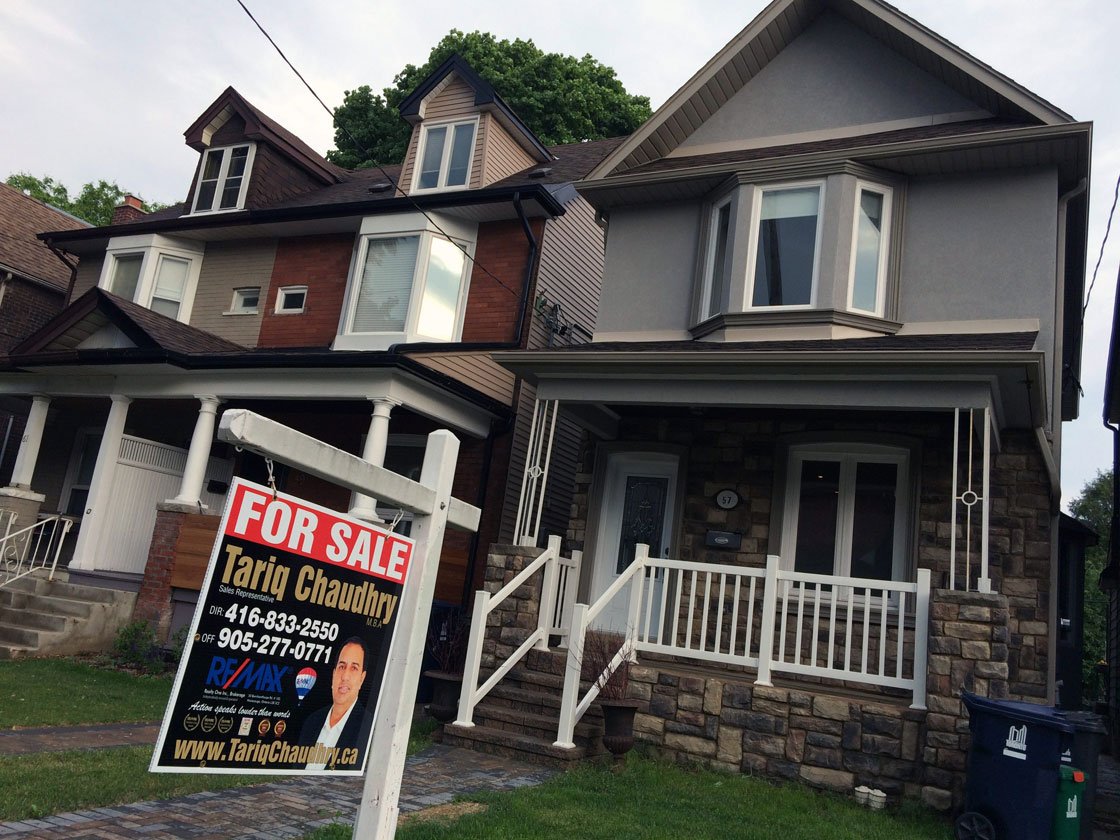Canada’s average home price fell to $491,000 in March, down 10.4 per cent from the same month a year ago, the Canadian Real Estate Association (CREA) said on Friday.

The drop largely reflects a dramatic market cool-off since last spring in Toronto and the surrounding Greater Golden Horseshoe region. Excluding Toronto and Vancouver, the average home priced slipped to $383,000 a dip of 2 per cent since March of 2017, CREA said.
But the steep national decline is also the result of a shift in the sales mix toward less pricey apartments and townhomes and away from detached homes in Toronto and Vancouver, BMO economist Robert Kavcic wrote in a note to clients.
READ MORE: Should you rent or buy? Take our personality quiz
“Recent changes to mortgage regulations are fueling demand for lower-priced homes while shrinking the pool of qualified buyers for higher-priced homes,” said Gregory Klump, CREA’s chief economist. “As a result, ‘affordably priced’ homes are becoming less affordable while mortgage financing for higher priced homes remains out of reach of many aspiring move-up homebuyers.”
READ MORE: New mortgage rules 2018: A practical guide
Benchmark home prices in Toronto were down 1.5 per cent year over year and as much as 7.1 per cent in the Oakville-Milton area. Home values in Guelph, on the other hand, were up 7.5 per cent compared to a year ago.

Get weekly money news
Greater Vancouver saw price growth of 16 per cent year-over-year, as homebuyer demand for lower-priced homes drove up prices for apartments and townhouses, while the price of single-family homes held steady. B.C.’s Fraser Valley saw prices up an eye-popping 24.4 per cent year over year.
NEED HOME-BUYING TIPS? SIGN UP FOR ERICA ALINI’S NEW MONEY123 NEWSLETTER
READ MORE: Could you pass the mortgage stress test? Here’s how to find out
In Alberta, Calgary and Edmonton saw little change, while prices slipped 4.6 per cent in Regina and 3.4 per cent in Saskatoon.
Ottawa and Montreal, meanwhile, continued to defy the national trend, with home prices up 7.7 per cent and 6.2 per cent year-over-year respectively.
WATCH: Is it better to pay down the mortgage faster or contribute to your RRSP?

Overall, CREA’s stats also portray a national housing market where house hunters are more likely to hold off for a better deal, while home sellers aren’t quite ready to give them one.
National sales activity in the first three months of the year was the slowest since 2014 and below year-ago levels in most markets, with the notable exception of Montreal and Ottawa. The number of homes sold in March of this year was down 22.7 per cent compared to the same period in 2017.
READ MORE: 3 tips that could save you thousands on your mortgage, as interest rates rise
This means most of Canada is neither a homebuyers’ nor a homesellers’ market right now. Nationally, the ratio of home sales compared to new home listings stood at 53 per cent, in line with the country’s long-run average. A sales-to-new-listings ratio of under 40 per cent is generally considered a homebuyers’ market, while a reading above 60 per cent marks a sellers’ market.
More than 60 per cent of local real estate markets were in what economists call “balanced market territory” in March 2018.









Comments
Want to discuss? Please read our Commenting Policy first.